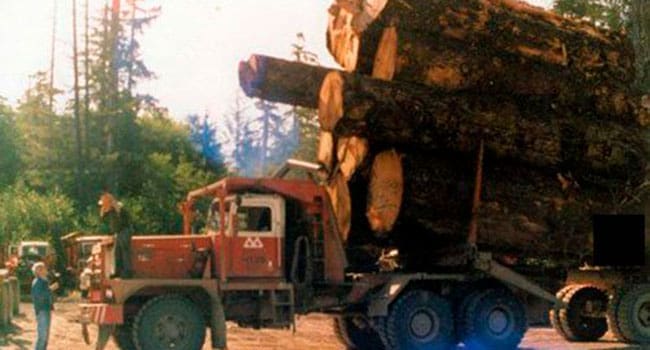 My first real boss was Ed Raymond, the foreman of the skidding crew I worked for in Juskatla logging camp, run by Mac and Blo (Macmillan and Bloedel Ltd.) in what was called the Queen Charlotte Islands (now Haida Gwaii).
My first real boss was Ed Raymond, the foreman of the skidding crew I worked for in Juskatla logging camp, run by Mac and Blo (Macmillan and Bloedel Ltd.) in what was called the Queen Charlotte Islands (now Haida Gwaii).
The fact that you have to explain who Mac and Blo were, and what Haida Gwaii used to be named on the map tells you quite a bit about our recent history, and arguably progress in the 21st century.
However, I’m pretty sure what I think of as progress wouldn’t cut it with Ed.
To start with, he was very unimpressed by my educational ambitions that I shared during our first lunch, after a hot morning of me setting chokers behind the Tree Farmer he was operating.
“So, what the f— are you doing with the money you’re earning this summer, kid?”
“Well, I’m going to use it to pay for my first year’s tuition at UBC.”
“What the f— use is that?”
“Well, I’m thinking of getting an Arts BA. …”
I suddenly realized that Ed was actually picking up his long aluminum thermos and getting ready to chuck it right at my head. Before I could really process what was about to happen, he winged it at me.
Ed was the slow pitch king on the Port Clements softball team and he deliberately missed me by a few (of what we then called) inches. The thermos bounced off the side of the red and white Mac and Blo crummy (the crew bus), and clattered into the road gravel.
“Listen up kid, you’re making a stupid decision. All that really matters is how many chunks you can get from stump to dump in this life. It’s called real work. Studying poetry in Point Grey doesn’t impress the kind of girls I go out with. Where’s the money in that?”
I remember thinking that it was pretty impressive that he knew Point Grey was where UBC was located. And I wondered what kind of girls he went out with.
As the logging summer of 1969 slowly passed, there were plenty more opportunities to learn about the world of physical labour, of union pay scales, the threat of being sent “down the road,” and marriages that somehow functioned on the five-weeks-on, two-weeks-off work cycle.
It was a world where hard work was expected and noticed. Where work camps housed 200 men, and one woman – the camp nurse. It was a world where competency was expected; where expertise at a high mechanical level earned commensurate status.
In the camp dining hall, the top trades ate together at the central tables. Your status was visually apparent at each meal. You quickly learned the camp hierarchy: first came fallers, then shop mechanics, then teamsters, then boom crew, then road crew, then office staff, then bullcooks, then chokermen.
We sat together at the farthest table from the food, next to the washroom door. We got our grub last. Often it was the definition of slim pickings. Simply wishing to eat better was a motivation to learn a decent trade – one that moved you at least a notch up from labourer.
There aren’t many Juskatla logging camps left in 2017. Mine only exists in memory. Increasingly, I think of the loggers I worked with when I read op-eds about the American ‘Red State,’ working-class base in the Washington Post, the New Yorker and the New York Times.
Ed Reynolds didn’t study poetry at UBC, or read op-eds and nuanced editorial essays. But he did understand that hard work was the way up, especially when twinned with trades training that involved increasing mechanical complexity. He understood a few things about sacrifice, too.
One has to wonder what the work world would offer Ed today. Bush camps of all descriptions are in shorter and shorter supply. Mines, liquefied natural gas plants, logging camps and hydro dam construction projects are everywhere receiving closer scrutiny and greater public disfavour.
We live in a world characterized by economic disruption. Would Ed drive for Uber, clean Airbnbs or work in an Amazon warehouse shipping facility?
Unlikely. He’d seek work that offered high union wages, basic autonomy and good chances for upward mobility.
The question is: where is that kind of work anymore? This is the issue at the root of our distemper.
Mike Robinson has been CEO of three Canadian NGOs: the Arctic Institute of North America, the Glenbow Museum and the Bill Reid Gallery. Mike has chaired the national boards of Friends of the Earth, the David Suzuki Foundation, and the Canadian Parks and Wilderness Society. In 2004, he became a Member of the Order of Canada.
The views, opinions and positions expressed by columnists and contributors are the author’s alone. They do not inherently or expressly reflect the views, opinions and/or positions of our publication.

